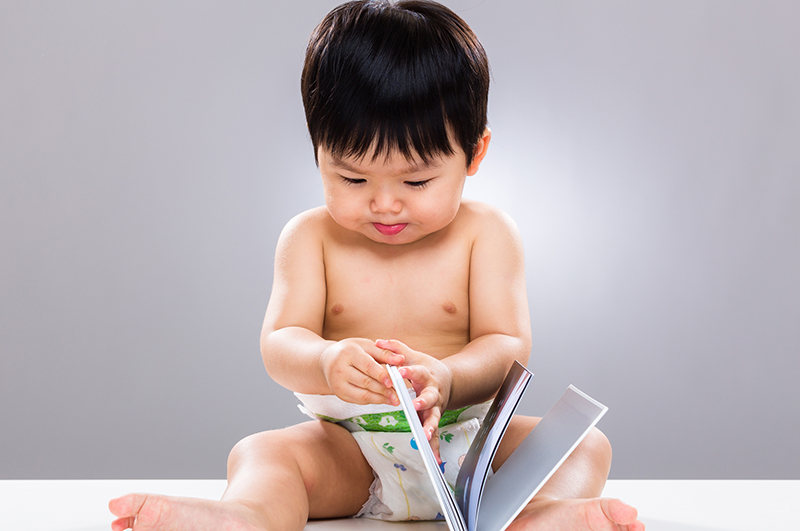Families For Life | Reading with Babies: 12-18 Months

Reading aloud and sharing stories with your baby is one of the most important and enjoyable things you can do together. If you’re not sure where or how to start reading, here are some ideas.
Why reading with your baby is important
Sharing stories, talking and singing every day helps your baby’s development in lots of ways.
You’re getting your baby familiar with sounds, words, language, print and, eventually, the value and joy of books. This all builds your baby’s early literacy skills, like the ability to listen to and understand words. It also helps him go on to read successfully later in childhood.
Reading stories stimulates your baby’s imagination and helps her learn about the world around her. It’s also a great time for you to bond with your baby and share time together.
You can start reading to your baby as early as you like – the earlier the better. Our articles on
reading stories with babies and children and
developing literacy have more information to get you and your baby started.
Sharing books with your baby
At this age and stage, reading with your baby is all about having fun with books and spending special time together.
Here are some tips to help you and your baby make the most of reading time:
Share a ‘goodnight’ book or family story after dinner or at bedtime every night.
Let your baby choose a book and get him to hold it and help turn the pages.
Use the rhythm of the book’s words to bounce your child on your knee, or pat her on her back in time to the rhythm.
Build on your child’s love for one particular book by offering to read his favourite book, as well as a new or different book.
Here are some general tips for reading with most young children:
Make a routine, and try to share at least one book every day. The routine could include a special reading space – for example, a chair, lounge or beanbag that’s big and comfortable enough for you and your child, with a box of books or bookshelf nearby.
Turn off the TV or radio, and find a quiet space to read so your child can hear your voice and focus on the book.
Hold your child close or on your knee while you read, so she can see your face and the book.
Point out the different parts of the book and name them, including the spine and front and back covers.
Point to words as you read, or run your finger along under the words. Encourage your child to repeat familiar words or phrases.
Slow down to give your child time to look at the pictures. Involve your child by getting him to talk about the pictures.
Try out funny noises and sounds, and use different voices for different characters – play and have fun!
Children often love to read the same book over and over. This might be a bit boring for you, but your child will enjoy it because she can learn the story and look forward to what’s coming next.
What to read with your baby
There are so many books to choose from that it can be hard to know where to start.
As a broad rule, young children often enjoy books that have good rhyme, rhythm and repetition – and this rhyming and repetition helps them learn. Also, your baby’s interests will guide you when you’re choosing new books. Your baby learns best when he’s interested in what you’re reading together.
Once your baby is about 12 months old, you could start looking for the following kinds of books, which she might especially enjoy:
Books about food, transport, animals and other babies and toddlers.
Board books, which are easier to handle and very sturdy.
Books that have pictures or illustrations of simple objects.
Lift-the-flap books that have hidden items in each picture for him to find.
Books that include textures like fabric or collage in the illustrations.
Here are some books your baby might enjoy and you can also check the availability of these books from the National Library:
My Body by Jill McDonald
Dear zoo by Rod Campbell
Dig dig digging ABC by Margaret Mayo
Freight train by Donald Crews
Rod Campbell's Animal Book
Spot by Eric Hill
Spot's first words: a touch-and-feel book
Spot goes to the libraryWhere is the green sheep? by Mem Fox
Why not visit your library? It’s free to join and borrow. The staff there will be able to recommend books for you and baby to enjoy.
Video: Early Literacy for Infants and Toddlers
Watch this video to learn about the importance of teaching literacy from a young age, and how to instill literacy skills in your child.
© raisingchildren.net.au, translated and adapted with permission
Explore more